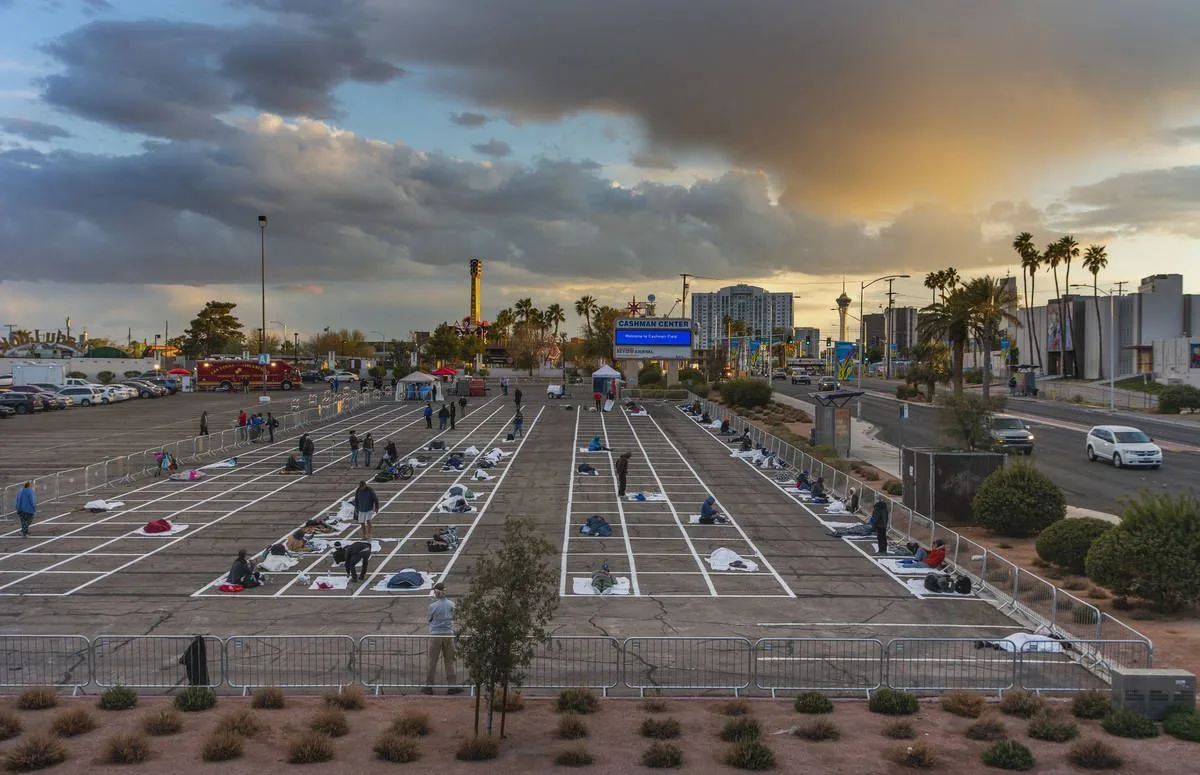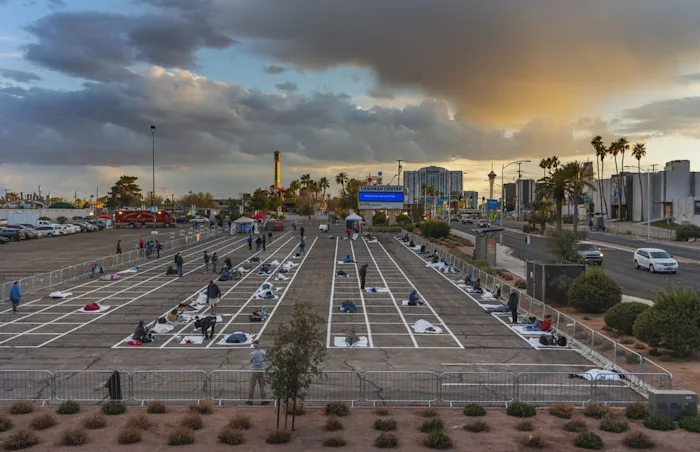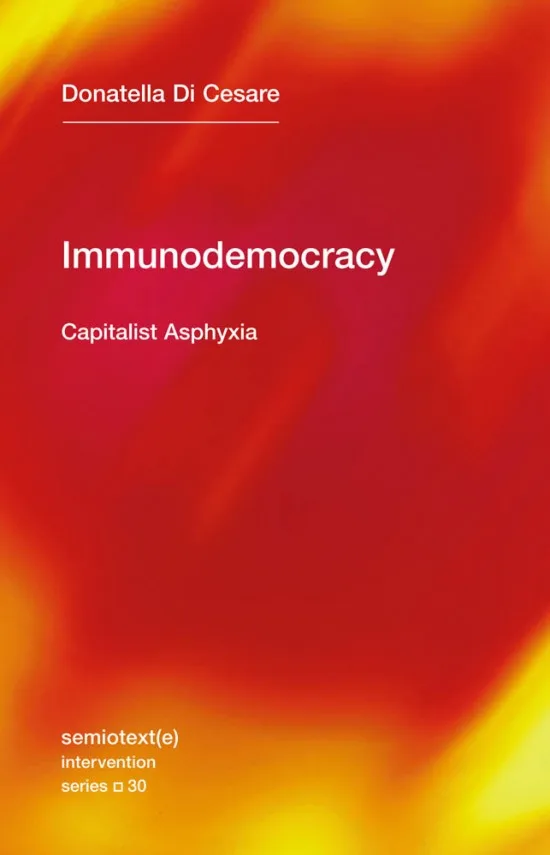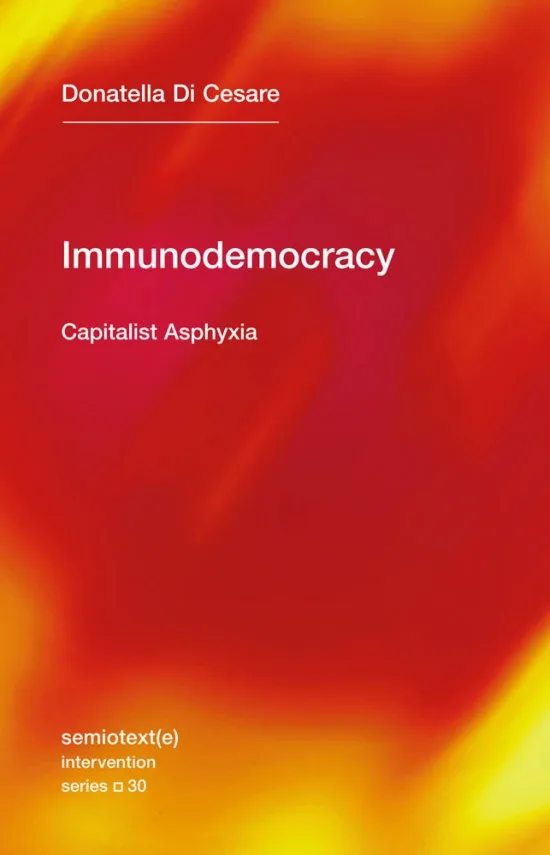Immunitarian Democracy
Donatella Di Cesare
The following text is taken from Immunodemocracy: Capitalist Asphyxia, due to appear this Spring with Semiotext(e).
Other languages: Deutsch, Français
In Las Vegas, homeless people were lined up like cars on the floor of an open-air parking lot. The city’s over one-hundred hotels had been closed due to the emergency — but even so, their rooms were reserved for those who had money. Left with nowhere to stay after contagion broke out at the Catholic Charities, where they had previously found shelter, the homeless were lined up on the ground at a secure distance from one another, each laid within a white rectangle painted on the cement. A few disabled people lay on the asphalt alongside their wheelchairs. The photos were chilling. The virus cast an unsparing spotlight on social apartheid.
Lesbos and Moria: the despicable gates of Europe, where refugees are massed together in tents and makeshift shelters. It is called ‘administrative detention’: although they have committed no crime, these people are enclosed behind barriers and barbed wire. This is a police management of migration. Cold, hunger, overcrowding, lack of water: the unhygienic, unsanitary conditions are ideal terrain for the epidemic to spread. But the warning signs raised by humanitarian organizations were not heeded. European public opinion had other things to worry about. In essence, nation-states’ war against migrants — indulged and supported by their own citizens, proud and jealous of their rights — could continue undisturbed, now with a few extra allies.
In India, Prime Minister Modi decreed the lockdown overnight without any warning. The first to be hit were internal migrants, in their hundreds of thousands. Now left without either a job or a home, they tried to jump onto any still-available means of transportation in order to return from the megacities to the rural areas from where they had first hailed. But the shutdown was already in force. Some self-isolated in trees, with neither medicine nor food. Others walked miles upon miles by foot — a desperate flight, captured and narrated by social media, TV channels and newspapers. The other victims, as well as migrants, were the dalits — the lowest of the low, those without any caste standing, the oppressed who used to be called “untouchables” because they were associated with impure activities, and thus the object of discrimination.
The poor and rejected do not inspire compassion: rather, they draw a mix of anger, disapproval and fear. The poor person is not worthy of redemption, for they are a failed consumer, a minus and not a plus on the unyielding balance-sheet, just as the rejected are a mere useless black hole. All responsibility for their fate is dropped in advance; any charity toward them a commendable initiative.
The cordon sanitaire of neglect risks widening beyond all proportion. The disparity between the protected and the defenseless, which defies any notion of justice, has never been as striking, as barefaced, as in the crisis that the coronavirus has prompted.
It is difficult to understand what is happening unless we look back — even amidst these conditions of shock and upheaval — to the recent past. The virus has sharpened and intensified an already established situation which has suddenly appeared in all its darkest and most heinous aspects. Seen through the prism of the virus, democracy in the West has turned out to be a system of immunity that had already been operating for some time. Now, it is merely doing so in less concealed fashion.
Debates on democracy examine how it can be defended, reformed, and improved. But what they do not put into doubt are its borders, what it means to belong to a democracy, or — still less — the bind that holds it together: namely, the fear of contagion, the fear of the other, the terror at what lies outside of it. This means overlooking the reality that discrimination is always-already there, latent and concealed. Even those citizens who do fight against racism (a very powerful virus!) — for instance, by demanding the opening of their country’s borders — take for granted their “ownership” over their “own” country, which is to say, their national belonging.
There is thus a presupposition at work, here — that of a closed natural community prepared to safeguard its own sovereign integrity. This potent fiction, which has been dominant for centuries, has driven the belief that birth — in the guise of a “signature” — is a sufficient basis for national belonging. Even if globalization has loosened such connections, the political perspective does not seem to have changed any great deal. The discussion focuses on matters of internal administration: reforming laws, improving efficiency, modernizing the tools of deliberation, providing guarantees for minorities — that is, democratizing democracy.
But this political perspective excludes reflection on borders — and overlooks the thorny question of belonging. The gaze is thus concentrated on the internal — turning our backs to all that is external. It is as if borders were taken-as-read; as if a community held up by genetic descent were self-evident. So long as they are assumed to be facts of nature, such questions are expelled from the political field, or better, depoliticized. This means that politics bases itself on a non-political foundation. This is, moreover, a discriminatory foundation, one which marks a within and an outside. This coercion is exercised on the citizen, too, albeit in a different way, Though the citizen enjoys protection, she is also caught within this order, without being able to have any choice in the matter. The contemporary political order captures and banishes, includes and excludes.
This is the context in which “immunitarian” democracy can operate. It is worth specifying, here, that this adjective is anything but harmless. Rather, it promises to harm and damage democracy. And can one truly speak of “democracy” where some are immunized but not others?


It is often forgotten that there are several different models of democracy — indeed, they sometimes stand in outright opposition. Ours is ever further from the model of the Greek pólis, however much we like to invoke its example. One ought not join those who indulge in a celebratory, enthusiastic vision of that model, ignoring its exclusion of women from public life and the dehumanization of slaves. Yet, for Greek citizens, involvement and participation were important.
What instead prevails in modern democracy is a model that, having first developed in the United States, has come to spread across the Western and Westernized world. It can be summarized in the formula: noli me tangere. This is all that the citizen requires of democracy: do not touch me. People, bodies, and ideas have to be able to exist, move, and express themselves untouched — which is to say, without being inhibited, constrained or forbidden by some external authority, at least so long as this is not utterly unavoidable. The whole tradition of liberal political thought has insisted on this negative conception of liberty. The demand is not for participation, but for protection. If the Greek citizen was interested in having a share in public power, the citizen of an immunitarian democracy first and foremost prioritizes his own security. It can be said that this is precisely the gravest limit of liberalism, which thus confuses guarantees with liberty. This negative vision undermines democracy, which is reduced to a system of immunity which has to safeguard human lives, in their multiple aspects.
As this model has imposed itself, the demands for protection have gradually increased. Alain Brossat has explained this insightfully, as he emphasizes the close connection between right and immunity. For citizens, their enjoyment of democracy often means nothing more than benefiting from rights, guarantees and defenses, in an ever more exclusive manner. Noli me tangere is the tacit watchword that inspires and guides that “battle for rights” in which, it is often believed, the most advanced front of civilization and progress can be identified. Of course, these struggles have been — and still are — important. Yet the real point lies elsewhere.
The condition of immunity reserved for some — the protected, the preserved, the guaranteed — is denied to others, i.e. the exposed, the rejected, the abandoned. One would wish for care, assistance, and rights for all. But this “all” is an ever more restricted sphere: it has borders, it excludes, it leaves behind remnants and leftovers. Inclusion is a much-paraded mirage; equality an empty word which now sounds like an insult. The discrepancy widens, the gap deepens. This is no longer only an apartheid against the poor. The discrimination lies precisely in the immunity, which itself digs the furrow of separation. This is true already within Western societies. And even more so outside, in the boundless hinterland of misery, in the planetary peripheries of despair and desolation. The system of guarantees and insurance policies does not reach the places where the losers of globalization live. Interned in the camps, parked in the urban voids, thrown away and piled up like refuse, they patiently await the possibility of being recycled. But the world of the disposable does not know what to do with excess. The dross brings pollution. It would be better, therefore, to keep at a distance these contaminated and contaminable remnants — the source of disease, the cause of contagion.
This other humanity — but would they then be “human”? — is inexorably delivered up to all kinds of violence. Delivered up to wars, genocides, famines, sexual exploitation, new forms of slavery, diseases. To our world’s mechanisms of control and protection there corresponds, in the other world, the disorder and uninterrupted unleashing of the forces of nature. Reduced to simple bodies, these “savages” confront uncontained infections, persistent epidemics like AIDS, and deadly viruses like Ebola, which barely make the news and do not enter into the dominant narration. Deep down, the citizen signed up to liberal democracy believes that the abandonment of the rejected is a reflection of their lack of civilization.
The immunitarian paradigm is the foundation of the unperturbable frostiness displayed by the immune faced with the pain suffered by “others” — meaning, not other people in general, but those liable to contagion. Over there, well, their pain is a predictable fate, an inevitability. But over here, even the smallest onset of illness must be relieved, even the slightest trouble eliminated. This, too, is a border. Anaesthesia is part of the history of democracy. Laurent de Sutter discusses this in his book on narcocapitalism. Hence to immunize ourselves is also to anaesthetize ourselves. It allows us to assume the mode of impassive spectators who look on at terrible injustices and the cruelest of crimes without feeling distress, without rising up in indignation. The disaster slips across the screen without leaving any trace. Though the immune citizen is connected, he is always-already unbound, exempt, beyond harm. The democratic anaesthesia takes away sensitivity and paralyses the raw nerve. To speak of “indifference,” as many do, would reduce this to an individual moral choice. But in fact, it is an eminently political question. At root, even to discuss this in terms of racism would be to reduce it to just one example of the phenomenon. Rather, this is an affective tetany, a spasmodic contraction that produces an irreversible numbness.
The more exacting and exclusive the immunization of those within, the more implacable becomes the exposure of those superfluous creatures on the outside. That is how immunitarian democracy functions.


This twin-track approach is already well illustrated by the experience of totalitarianism. Hannah Arendt’s famous analysis of this phenomenon offered more than one warning in this regard. According to this reading, non-persons — the “scum of the earth” floating around between national borders — were chased back into a natural condition, into a defenseless bare life, in which it would be impossible to conserve even humanity itself. A finger was pointed in accusation against the shipwreck of human rights. Today’s world believes that it has separated itself from the totalitarian past — erasing this memory with a quick dab of the sponge. But here, the twin-track has become an entrenched duality. This division is marked out by the very movement of civilization — a partition which is peddled as a struggle against barbarism and passed off as democratic progress.
Of course, the condition of immunity is not a guaranteed right; rather, it is a general norm that varies even within the liberal democracies, depending on the power dynamics at play therein. If we needed evidence of this, we need only think of the bodies of women, as they risk all manner of abuse and discrimination within the workplace as well as within the walls of the home. The body of a homeless person under arrest in a police station is also anything but untouchable — or indeed, that of an elderly person relegated to a nursing home.
But the immunization that seeks to protect the body (and mind) of each citizen is an important reality. The forms of aversion multiply, the phobia toward contact spreads, and retreating into oneself becomes a spontaneous act. Indeed, it is precisely in this latter movement that we should make out the tendency of the citizen who distances himself from the pólis and all that he has in common with it. He no longer answers to it. He is disaffected. The immunized citizen’s anaesthesia and the low intensity of his political passions make him an impassive spectator on the world’s disasters. But they are also his downfall. Where immunity prevails, community declines. Roberto Esposito has explained as much, as he connects the bonds of community to the shared fear of death. Today, from time to time, a highly fleeting fear—one that is both widespread and uncertain—clots together the community of a phantasmal “us.”


The Latin word immunitas includes the Latin root munus. This term is difficult to translate: it means tribute, gift, and duty, but in the sense of a debt that can never be repaid, a mutual obligation that establishes an inexorable bond. Indeed, to be exempt, to receive dispensation, is to be immune.
The opposite of the immune is the common. But individual and collective are the two mirror-image faces of the immunitarian regime. The common indicates the sharing of a mutual obligation. In no way does this mean mere fusion. To be part of a community means to be linked, bound to each other, constantly exposed, ever-vulnerable.
Hence the reason why community is constitutively open. Community cannot take the form of a self-identical fortress, closed, defended and protected. If that were so, it would instead be an immunitarian regime. Especially in recent years, a paradoxical ambiguity has developed, in which community is swapped for its opposite — immunity. This shift is plain for all to see. Thus, democracy thrashes around, caught between two opposed and irreconcilable tendencies. This is the point where its very future will be played out. Immunitarian democracy is impoverished of community — it is almost entirely bereft of it. “Community” is discussed in such a manner that it means nothing beyond a set of institutions headed by some authority principle. The citizen is subjected to those who guarantee her protection. But she is on her guard against exposure to the other, and careful to avoid the risk of contact. The other is infection, contamination, contagion.
The politics of immunization always and in every case pushes back against otherness. The border becomes the cordon sanitaire. All that comes from the outside reignites fear, reawakens the trauma which the citizen body believed that it had immunized itself against. The foreigner is the intruder par excellence. Immigration has thus come to appear as the most troubling threat.
Yet the devastating effects of immunization, including a large number of autoimmune diseases, hit citizens themselves. And perhaps only in this epochal crisis are these effects becoming clearly apparent. For example, where the sovereign administrator ends up unveiling the dark, monstrous face behind his mask — allowing people to die because of carelessness, cold-heartedness, and incompetence.
The citizen of an immunitarian democracy, precluded from sharing in the experience of the other, resigns herself to following all the rules of health and hygiene. Indeed, she has no difficulty in recognizing herself as a patient. The heterogeneous spheres of politics and medicine overlap and meld together. One cannot know where right ends and healthcare begins. Political action tends to take on a medical modality, while medical practice becomes politicized. Here, too, Nazism provided the model — however scandalous it may seem to remind ourselves of this.
The citizen-patient is more patient than citizen. For it seems that she can enjoy defenses and protections and benefit from life in that part of the world with anaesthetic-immunitarian conditions. But she cannot but ask herself what the outcomes of a pastoral-medical democracy will be; she cannot but look on, worried, at the autoimmune reaction getting the upper hand.


May, 2020
Translated by David Broder